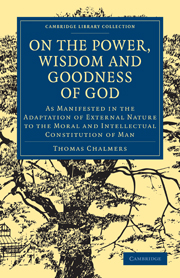 On the Power, Wisdom and Goodness of God
On the Power, Wisdom and Goodness of God Book contents
- Frontmatter
- Dedication
- NOTICE
- Contents
- PREFACE
- INTRODUCTORY CHAPTER
- PART I ON THE ADAPTATION OF EXTERNAL NATURE TO THE MORAL CONSTITUTION OF MAN
- CHAP. I FIRST GENERAL ARGUMENT
- CHAP. II SECOND GENERAL ARGUMENT
- CHAP. III THIRD GENERAL ARGUMENT
- CHAP. IV On the General Adaptation of External Nature to the Moral Constitution of Man
- CHAP. V On the Special and Subordinate Adaptations of External Nature to the Moral Constitution of Man
CHAP. II - SECOND GENERAL ARGUMENT
Published online by Cambridge University Press: 29 August 2010
- Frontmatter
- Dedication
- NOTICE
- Contents
- PREFACE
- INTRODUCTORY CHAPTER
- PART I ON THE ADAPTATION OF EXTERNAL NATURE TO THE MORAL CONSTITUTION OF MAN
- CHAP. I FIRST GENERAL ARGUMENT
- CHAP. II SECOND GENERAL ARGUMENT
- CHAP. III THIRD GENERAL ARGUMENT
- CHAP. IV On the General Adaptation of External Nature to the Moral Constitution of Man
- CHAP. V On the Special and Subordinate Adaptations of External Nature to the Moral Constitution of Man
Summary
On the inherent Pleasure of the Virtuous, and Misery of the Vicious Affections
1. We are often told by moralists, that there is a native and essential happiness in moral worth; and a like native and essential wretchedness in moral depravity—insomuch that the one may be regarded as its own reward, and the other as its own punishment. We do not always recollect that this happiness on the one hand, and this misery on the other, are each of them made up, severally of distinct ingredients; and that thus, by mental analysis, we might strengthen our argument both for the being and the character of God. When we discover, that, into this alleged happiness of the good there enter more enjoyments than one, we thereby obtain two or more testimonies of the divine regard for virtue; and the proof is enhanced in the same peculiar way, that the evidence of design is, in any other department of creation, when we perceive the concurrence of so many separate and independent elements, which meet together for the production of some complex and beneficial result.
2. We have already spoken of one such ingredient. There is a felt satisfaction in the thought of having done what we know to be right; and, in counterpart to this complacency of self-approbation, there is a felt discomfort, amounting often to bitter and remorseful agony, in the thought of having done what conscience tells us to be wrong.
- Type
- Chapter
- Information
- On the Power, Wisdom and Goodness of GodAs Manifested in the Adaptation of External Nature to the Moral and Intellectual Constitution of Man, pp. 98 - 132Publisher: Cambridge University PressPrint publication year: 2009First published in: 1834
